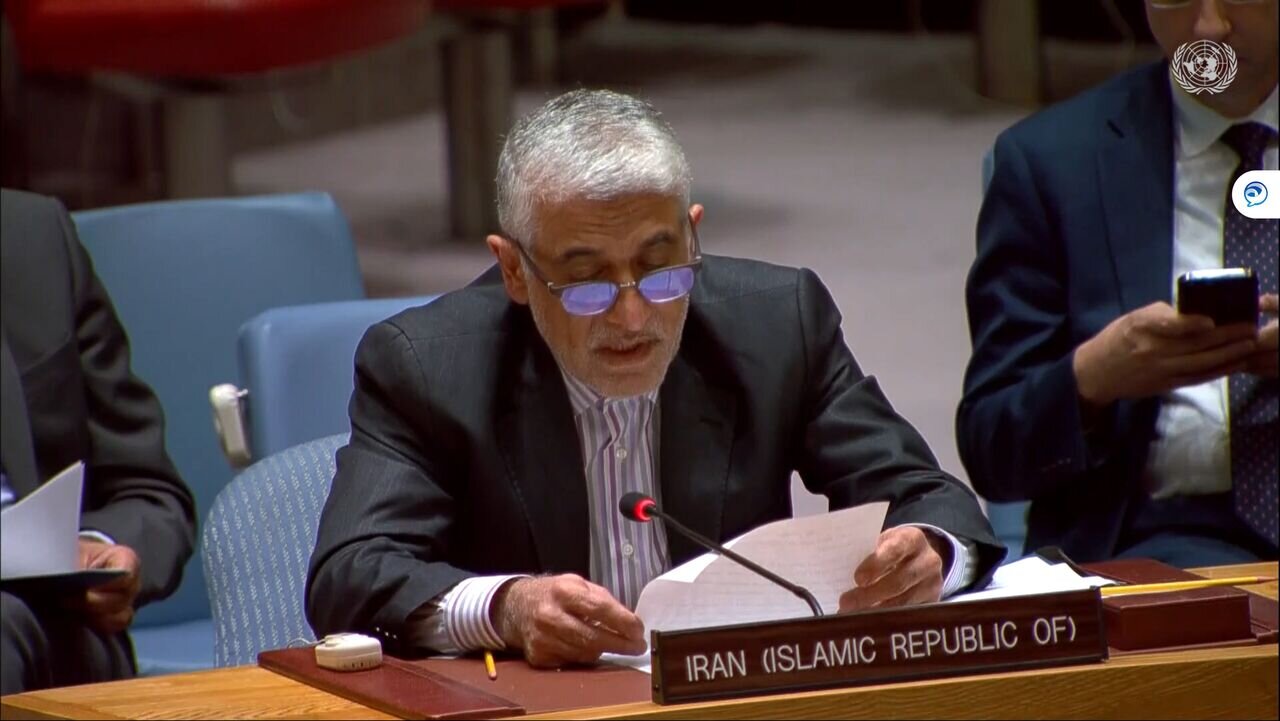West should be held accountable for aiding Saddam against Iran in 1980s: envoy

TEHRAN- Amir Saeed Iravani, the Permanent Representative of Iran to the UN, on Tuesday slammed several Western nations for aiding and abetting the former Iraqi tyrant Saddam Hussein in the 1980s and demanded that they take responsibility for their actions.
“Western countries, including France, the United Kingdom, and the United States, bear a responsibility for supporting and collaborating with the Saddam regime during Iraq's war against Iran,” Iravani told a UN Security Council meeting on the situation in the Middle East with a focus on Syria.
The full text of Iravani's speech is as follows:
Iran once again condemns the use of chemical weapons by anyone, anywhere, and under any circumstances. The use of such lethal weapons is a flagrant violation of international law, constitutes a crime against humanity, and poses a serious threat to international peace and security.
Iran has tragically been one of the primary victims of chemical weapons. On June 28, 1987, the city of Sardasht in Iran endured a devastating chemical weapons attack, leading to the immense suffering and loss of innocent civilians, including women and children.
Western countries, including France, the United Kingdom, and the United States, bear a responsibility for supporting and collaborating with the Saddam regime during Iraq's war against Iran. Their complicity enabled the systematic use of chemical weapons against the Iranian people, an act that should not be forgotten.
The silence or active participation of Western countries in these atrocities undermined the pursuit of justice and revealed blatant double standards. This also hindered the UN Security Council's ability to fulfill its responsibilities and hold perpetrators accountable for such heinous crimes.
The Syrian Arab Republic remains steadfast in its commitment to fulfilling its obligations under the Chemical Weapons Convention. In alignment with this commitment, the Syrian government has maintained a constructive and cooperative approach towards the Organization for the Prohibition of Chemical Weapons (OPCW).
The Secretariat report confirms that all 27 declared chemical weapons production facilities (CWPFs) in Syria have been successfully destroyed. To ensure transparency and accountability, Syria has been regularly submitting monthly reports on the progress of chemical weapons dismantlement.
In May and June 2023, Syria submitted its 114th and 115th monthly reports to the OPCW Director-General, providing details of the activities carried out to dismantle chemical weapons and their production facilities. Moreover, Syria has facilitated two visits by a reduced team from the Declaration Assessment Team (DAT) to Damascus this year. During these visits, the Syrian National Authority extended its full cooperation by allowing access to sites, collecting samples, and conducting interviews with witnesses.
In line with the suggestion made by the Syrian National Authority, a separate meeting with a higher-level DAT was held in Beirut at the end of the last month, demonstrating Syria's commitment to engagement and cooperation.
Additionally, the Syrian National Authority has agreed to extend the tripartite agreement between the Syrian Arab Republic, the OPCW technical secretariat, and the United Nations Office for Project Services. This extension, effective until the 31st of December this year, aims to facilitate the tasks and activities of the OPCW in Syria.
Through these actions, Syria is actively demonstrating its dedication to fulfilling its obligations and cooperating with the OPCW in the pursuit of the complete eradication of chemical weapons within its territory.
We fully support promoting constructive dialogue between Syria and the OPCW at the highest level, setting a specific timeframe to address any remaining issues and bring the file to a final and conclusive closure. Such an approach will ensure transparency, accountability, and a satisfactory resolution to all outstanding matters related to chemical weapons in Syria. In this context, we applaud Syria's determination to convene such a high-level meeting.
The integrity and credibility of the OPCW, as an international body, hinge on its ability to remain neutral and objective, guided solely by scientific and technical considerations. This approach is essential in effectively preventing the use of chemical weapons and advancing the goals of the Convention.
Furthermore, any investigation must be impartial, professional, reliable, and objective. Such investigations must fully adhere to the requirements and procedures outlined in the Convention.
To effectively address unresolved issues and maintain the technical nature of discussions, it is crucial to avoid politicizing the matter and employing double standards. By doing so, we can work towards justice, accountability, and the prevention of further atrocities.
Leave a Comment